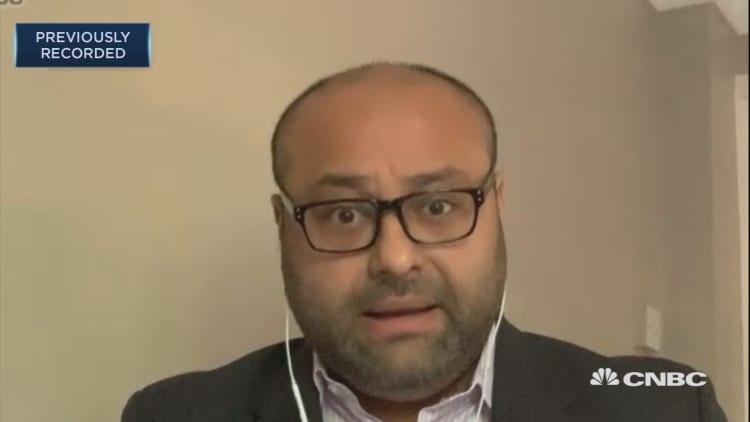
Investing by a "vaccine playbook" is a dangerous approach to take, one strategist has warned, after news flow from the pharmaceuticals industry bolstered market volatility earlier this week.
Speaking to CNBC's "Squawk Box Europe" on Wednesday, Fahad Kamal, chief market strategist at Kleinwort Hambros, said recent market moves had demonstrated "how dangerous it is to follow any kind of vaccine playbook."
Biotech firm Moderna sent markets higher on Monday after reporting positive data on an early stage trial for its Covid-19 vaccine. However, markets snapped back later in the week after vaccine experts expressed skepticism about Moderna's data, and the economic damage from the crisis reentered focus.
The firm's chairman told CNBC that it would never put out data on its potential vaccine that was different from "reality."
Kamal noted that most scientific experts believe it will take at least 12-to-18 months for a safe-to-use vaccine to be rolled out to the market.
"The few people who seem to be more optimistic than that appear to have political agendas," he told CNBC. "So I would err on the side of science and say we're still quite a way away from that."
President Trump has voiced ambitions for a vaccine to be developed and distributed by the end of this year, in a project dubbed "Operation Warp Speed."
However, medical experts — including Dr. Anthony Fauci, the U.S. government's top infectious disease expert — have cast doubt on Trump's goal, expressing skepticism over the timeframe.
Kamal also emphasized that a vaccine would not be a miracle fix for all problems created by the coronavirus outbreak.
"Even if a vaccine was to be developed by the end of this year, we're already seeing such dramatic scarring in the economy that it's not going to be just as simple as flipping a switch and coming right back to where we were at the beginning of this year," he told CNBC. "There is going to be residual damage that's going to take a lot longer to work out."
World Bank President David Malpass said on Tuesday that the organization expected the global economy to contract by 5% this year, resulting in the loss of millions of jobs and a rise in worldwide poverty.
Dead cat bounce
Wall Street saw its worst first-quarter on record as the new coronavirus became a worldwide pandemic, but shares rallied in April and have been volatile in May on the back of news around the virus and potential vaccines and treatments. European and Asian markets have followed a similar pattern.
While stocks have generally showed signs of a recovery since their dramatic decline in March, however, Kamal warned investors on Wednesday not to be too optimistic about the bounce back.
"This is classic dead cat bounce," he told CNBC. "Of course we don't have a crystal ball, but if you look at the speed of this rally, if you look at the valuations from when the March 23 trough occurred to where we are right now, and given the general state of the wider economy and (the fact that) earnings are still going down, it would have been extremely unusual for us to have reached a bottom on the 23rd of March."
Government-imposed lockdown measures, coupled with supply and demand shocks from the coronavirus crisis, hit corporate earnings in the first quarter, and a number of analysts have warned that companies could take longer than markets are anticipating to recover.
Describing the corporate landscape as "Darwinian," Kamal advised investors to look at companies on a case-by-case basis, considering their balance sheet, market position and resilience. He also cautioned against tarring firms with a broad brush based on industry, noting that some tech firms — like Uber or WeWork — were not faring well, despite tech stocks often being seen as a safe bet.
"On the other hand, there are going to be some airlines and others, those which have cash, those which can manage to survive now, which will be looking to consolidate their market positions, gain market share, and really come out of this entire crisis much stronger," he said. "If you think about the well-capitalized Qatar Airways-type players in the world, they could probably be stronger in a few years."

